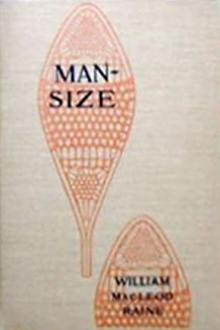Laughing Bill Hyde and Other Stories by Rex Beach (ebook smartphone .TXT) 📗

- Author: Rex Beach
Book online «Laughing Bill Hyde and Other Stories by Rex Beach (ebook smartphone .TXT) 📗». Author Rex Beach
Under our highly developed competitive system, modern business is done very largely upon personality. From the attitude of both father and son, Hanford began to count his chickens. Instead of letting up, however, he redoubled his efforts, which was his way. He spent so much time on the matter that his other work suffered, and in consequence his firm called him down. He outlined his progress with the Atlantic Bridge Company, declared he was going to succeed, and continued to camp with the job, notwithstanding the firm's open doubts.
Sixty days after his first interview he had another visit with Wylie, senior, during which the latter drained him of information and made an appointment for a month later. Said Mr. Wylie:
"You impress me strongly, Hanford, and I want my associates to hear you. Get your proposition into shape and make the same talk to them that you have made to me."
Hanford went away elated; he even bragged a bit at the office, and the report got around among the other salesmen that he really had done the impossible and had pulled off something big with the Atlantic. It was a busy month for that young gentleman, and when the red-letter day at last arrived he went on to Newark to find both Wylies awaiting him.
"Well, sir, are you prepared to make a good argument?" the father inquired.
"I am." Hanford decided that three months was not too long a time to devote to work of this magnitude, after all.
"I want you to do your best," the bridge-builder continued, encouragingly, then he led Hanford into the directors' room, where, to his visitor's astonishment, some fifty men were seated.
"These are our salesmen," announced Mr. Wylie. He introduced Hanford to them with the request that they listen attentively to what the young man had to say.
It was rather nervous work for Hanford, but he soon warmed up and forgot his embarrassment. He stood on his feet for two long hours pleading as if for his life. He went over the Atlantic plant from end to end; he showed the economic necessity for new machinery; then he explained the efficiency of his own appliances. He took rival types and picked them to pieces, pointing out their inferiority. He showed his familiarity with bridge work by going into figures which bore out his contention that the Atlantic's output could be increased and at an actual monthly saving. He wound up by proving that the General Equipment Company was the one concern best fitted to effect the improvement.
It had taken months of unremitting toil to prepare himself for this exposition, but the young fellow felt he had made his case. When he took up the cost of the proposed instalment, however, Mr. Jackson Wylie, Sr., interrupted him.
"That is all I care to have you cover," the latter explained. "Thank you very kindly, Mr. Hanford."
Hanford sat down and wiped his forehead, whereupon the other stepped forward and addressed his employees.
"Gentlemen," said he, "you have just listened to the best argument I ever heard. I purposely called you in from the road so that you might have a practical lesson in salesmanship and learn something from an outsider about your own business. I want you to profit by this talk. Take it to heart and apply it to your own customers. Our selling efficiency has deteriorated lately; you are getting lazy. I want you to wake up and show better results. That is all. You might thank this young gentleman for his kindness."
When the audience had dispersed, Hanford inquired, blankly, "Don't you intend to act on my suggestions?"
"Oh no!" said Mr. Wylie, in apparent surprise. "We are doing nicely, as it is. I merely wanted you to address the boys."
"But—I've spent three months of hard labor on this! You led me to believe that you would put in new equipment."
The younger Wylie laughed, languidly exhaling a lungful of cigarette smoke. "When Dad gets ready to purchase, he'll let you know," said he.
Six months later the Atlantic Bridge Company placed a mammoth order with Hanford's rival concern, and he was not even asked to figure on it.
That is how the seeds of this story were sown. Of course the facts got out, for those Atlantic salesmen were not wanting in a sense of humor, and Hanford was joshed in every quarter. To make matters worse, his firm called him to account for his wasted time, implying that something was evidently wrong with his selling methods. Thus began a lack of confidence which quickly developed into strained relations. The result was inevitable; Hanford saw what was coming and was wise enough to resign his position.
But it was the ridicule that hurt him most. He was unable to get away from that. Had he been at all emotional, he would have sworn a vendetta, so deep and lasting was the hurt, but he did not; he merely failed to forget, which, after all, is not so different.
It seemed queer that Henry Hanford should wind up in the bridge business himself, after attempting to fill several unsatisfactory positions, and yet there was nothing remarkable about it, for that three months of intense application at the Atlantic plant had given him a groundwork which came in handy when the Patterson Bridge Company offered him a desk. He was a good salesman; he worked hard and in time he was promoted. By and by the story was forgotten—by every one except Henry Hanford. But he had lost a considerable number of precious years.
* * * * *
When it became known that the English and Continental structural shops were so full of work that they could not figure on the mammoth five-million-dollar steel structure designed to span the Barrata River in Africa, and when the Royal Commission in London finally advertised broadcast that time was the essence of this contract, Mr. Jackson Wylie, Sr., realized that his plant was equipped to handle the job in magnificent shape, with large profit to himself and with great renown to the Wylie name. He therefore sent his son, Jackson Wylie, the Second, now a full-fledged partner, to London armed with letters to almost everybody in England from almost everybody in America.
Two weeks later—the Patterson Bridge Company was not so aggressive as its more pretentious rival—Henry Hanford went abroad on the same mission, but he carried no letters of introduction for the very good reason that he possessed neither commercial influence nor social prestige. Bradstreets had never rated him, and Who's Who contained no names with which he was familiar.
Jackson Wylie, the Second had been to London frequently, and he was accustomed to English life. He had friends with headquarters at Prince's and at Romano's, friends who were delighted to entertain so prominent an American; his letters gave him the entree to many of the best clubs and paved his way socially wherever he chose to go.
It was Hanford's first trip across, and he arrived on British soil without so much as a knowledge of English coins, with nothing in the way of baggage except a grip full of blue-prints, and with no destination except the Parliament buildings, where he had been led to believe the Royal Barrata Bridge Commission was eagerly and impatiently awaiting his coming. But when he called at the Parliament buildings he failed not only to find the Commission, but even to encounter anybody who knew anything about it. He did manage to locate the office, after some patient effort, but learned that it was nothing more than a forwarding address, and that no member of the Commission had been there for several weeks. He was informed that the Commission had convened once, and therefore was not entirely an imaginary body; beyond that he could discover nothing. On his second visit to the office he was told that Sir Thomas Drummond, the chairman, was inside, having run down from his shooting-lodge in Scotland for the day. But Sir Thomas's clerk, with whom Hanford had become acquainted at the time of his first call, informed him that Mr. Jackson Wylie, the Second, from America, was closeted with his lordship, and in consequence his lordship could not be disturbed. Later, when Hanford got more thoroughly in touch with the general situation, he began to realize that introductions, influence, social prestige would in all probability go farther toward landing the Barrata Bridge than mere engineering, ability or close figuring—facts with which the younger Wylie was already familiar, and against which he had provided. It also became plain to Hanford as time went on that the contract would of necessity go to America, for none of the European shops were in position to complete it on time.
Owing to government needs, this huge, eleven-span structure had to be on the ground within ninety days from the date of the signing of the contract, and erected within eight months thereafter. The Commission's clerk, a big, red-faced, jovial fellow, informed Hanford that price was not nearly so essential as time of delivery; that although the contract glittered with alluring bonuses and was heavily weighted with forfeits, neither bonuses nor forfeitures could in the slightest manner compensate for a delay in time. It was due to this very fact, to the peculiar urgency of the occasion, that the Commissioners were inclined to look askance at prospective bidders who might in any way fail to complete the task as specified.
"If all that is true, tell me why Wylie gets the call?" Hanford inquired.
"I understand he has the very highest references," said the
Englishman.
"No doubt. But you can't build bridges with letters of introduction, even in Africa."
"Probably not. But Sir Thomas is a big man; Mr. Wylie is one of his sort. They meet on common ground, don't you see?"
"Well, if I can't arrange an interview with any member of the
Commission, I can at least take you to lunch. Will you go?"
The clerk declared that he would, indeed, and in the days that followed the two saw much of each other. This fellow, Lowe by name, interested Hanford. He was a cosmopolite; he was polished to the hardness of agate by a life spent in many lands. He possessed a cold eye and a firm chin; he was a complex mixture of daredeviltry and meekness. He had fought in a war or two, and he had led hopes quite as forlorn as the one Hanford was now engaged upon. It was this bond, perhaps, which drew the two together.
In spite of Lowe's assistance Hanford found it extremely difficult, nay, almost impossible, to obtain any real inside information concerning the Barrata Bridge; wherever he turned he brought up against a blank wall of English impassiveness: he even experienced difficulty in securing the blue-prints he wanted.
"It looks pretty tough for you," Lowe told him one day. "I'm afraid you're going to come a cropper, old man. This chap Wylie has the rail and he's running well. He has opened an office, I believe."
"So I understand. Well, the race isn't over yet, and I'm a good stayer. This is the biggest thing I ever tackled and it means a lot to me—more than you imagine."
"How so?"
Hanford recited the story of his old wrong, to Lowe's frank amazement.
"What a rotten trick!" the latter remarked.
"Yes! And—I don't forget."
"You'd better forget this job. It takes pull to get consideration from people like Sir Thomas, and Wylie has more than he needs. A fellow without it hasn't a chance. Look at me, for instance, working at a desk! Bah!"
"Want to try something else?"
"I do! And you'd better follow suit."
Hanford shook his head. "I never quit—I can't. When my chance at this bridge comes along—"
Lowe laughed.
"Oh, the chance will come. Chances always come; sometimes we don't see them, that's all. When this one comes I want to be ready. Meanwhile, I think I'll reconnoiter Wylie's new office and find out what's doing."
Day after day Henry Hanford pursued his work doggedly, seeing much





Comments (0)